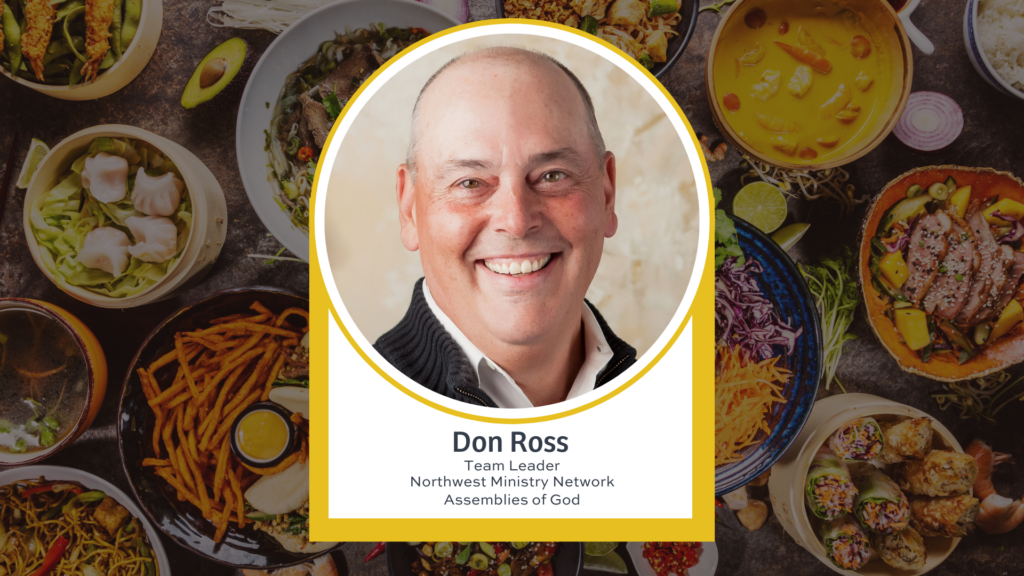Three Ways to Learn
Listen
Watch
Show Notes
Church planting is harder than it used to be. Could Dinner Church provide a new path for denominations, networks and church planters?
Don Ross is the superintendent for the Northwest Ministry Network, one of the largest church-planting networks in the Assemblies of God denomination. He has championed a network-wide Dinner Church initiative that has added dozens of new congregations to the states of Washington and northern Idaho over the past few years. In this episode, you’ll hear from Don about how his approach has helped open doors to start Dinner Churches in unlikely places.
Help us spread the word about the Dinner Church podcast by subscribing and leaving us reviews on Apple Podcasts, Spotify, YouTube or wherever you enjoy your podcasts.

Related Resources:
Email us: podcasts@freshexpressions.com
Interview Summary
Don Ross once said, ‘Dinner church just works wherever people eat.’ In a time of rising secularism and diminishing church attendance, his approach to spirituality is not just refreshing—it’s necessary. – Don Ross
In this latest episode of the Dinner Church Podcast, we dive deep with Don Ross, the superintendent of the Northwest Ministry Network of the Assemblies of God, covering Washington and northern Idaho. With a rich background in church leadership and an innovative approach to ministry, Ross brings his extensive experience and heartfelt dedication to the conversation.
Don Ross has a legacy of church planting and pastoral leadership. From his early days in Ballard, a historic Seattle suburb, to his role in transforming struggling churches into thriving communities, Ross has always been a visionary leader. His transition from pastoring one of Seattle’s first megachurches to leading a network of 350 churches is not just a career shift but a calling.
A Closer Look at Dinner Churches
The concept of dinner churches, as Ross explains, is based on the primitive Christian tradition of the ‘table church.’ This approach has proven effective in both urban and rural settings, providing a platform for community building and spiritual discourse over a shared meal. The simplicity and effectiveness of this model have led to the establishment of multiple dinner churches under Ross’s leadership.
Innovation Through Tradition
The dinner church model revives an ancient Christian tradition that brings people together through shared meals and spiritual fellowship. Ross articulates the significance of this revival:
We really felt the Lord direct us to begin to experiment with this ancient form of church, the table church.
This approach not only fosters a deep sense of community but also bridges the gap between traditional and contemporary worship practices. By reintroducing this historical model, Ross demonstrates how ancient practices can be innovatively adapted to meet modern spiritual and communal needs.
Challenges and Triumphs
Ross’s leadership journey illustrates a path marked by significant challenges, including navigating the decline of a historic church and facing leadership and financial crises. However, his strategic focus on prayer, community engagement, and restructuring has led to profound triumphs. Reflecting on this journey, Ross shares, “Came up the other side. It was agonizing. It was a six-month transition from our old campus that took five years.” These experiences highlight the resilience and adaptability required to lead effectively in complex and changing circumstances.
Expanding the Network
Under Ross’s guidance, the network has seen an impressive expansion, characterized by the strategic planting of new churches and the fostering of robust support systems. This expansion strategy is built on a foundation of clear vision casting, collaboration with larger churches, and a willingness to embrace uncertainty to move forward. Emphasizing his approach, Ross notes,
We’re going to move forward with wait for it focused ambiguity.
His focus on creating a sustainable model for growth underscores the importance of adaptive strategies in church leadership.
Theological and Social Foundations
Ross emphasizes the crucial role of understanding both the theological and social aspects of implementing the dinner church model. This dual focus ensures that the church remains relevant and effective in its mission, catering to the spiritual needs while also addressing the social dynamics of the community it serves. He highlights this balance, stating, “You must understand both the theology and the sociology or you will not get it.” This approach advocates for a holistic understanding of ministry that considers both the spiritual doctrines and the social contexts of the congregants.
The episode with Don Ross is more than just an exploration of his achievements; it’s a testament to the power of adaptive church models in contemporary ministry. The dinner church, as Ross outlines, isn’t just a method of church planting; it’s a revival of a deeply relational, community-focused form of worship that resonates across various demographics.
Reflection Questions
- How can traditional church settings incorporate more community-focused elements seen in dinner churches?
- What are the potential benefits and challenges of implementing the dinner church model in your community?
- How does the concept of ‘focused ambiguity’ apply to other areas of ministry or personal growth?
- In what ways can understanding the social context of your community enhance your ministry efforts?
- What does the success of dinner churches tell us about the evolving needs of churchgoers today?
- What are the implications of the dinner church model for church growth and revitalization strategies?
- How does the dinner church model align with the biblical principles of fellowship and community?

